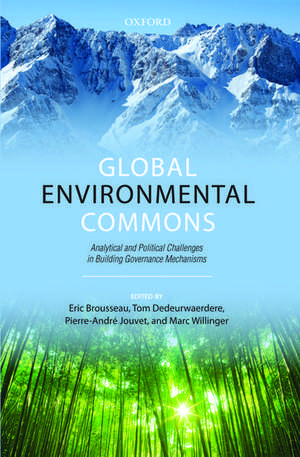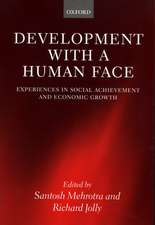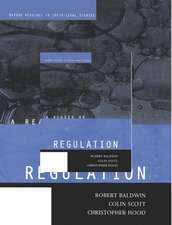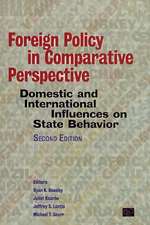Global Environmental Commons: Analytical and Political Challenges in Building Governance Mechanisms
Editat de Eric Brousseau, Tom Dedeurwaerdere, Pierre-André Jouvet, Marc Willingeren Limba Engleză Hardback – 25 iul 2012
Preț: 823.02 lei
Preț vechi: 1179.69 lei
-30% Nou
Puncte Express: 1235
Preț estimativ în valută:
157.49€ • 164.76$ • 130.82£
157.49€ • 164.76$ • 130.82£
Carte tipărită la comandă
Livrare economică 24-29 martie
Preluare comenzi: 021 569.72.76
Specificații
ISBN-13: 9780199656202
ISBN-10: 0199656207
Pagini: 460
Ilustrații: 6 Figures, 12 Tables, 5 Boxes
Dimensiuni: 163 x 240 x 31 mm
Greutate: 0.82 kg
Editura: OUP OXFORD
Colecția OUP Oxford
Locul publicării:Oxford, United Kingdom
ISBN-10: 0199656207
Pagini: 460
Ilustrații: 6 Figures, 12 Tables, 5 Boxes
Dimensiuni: 163 x 240 x 31 mm
Greutate: 0.82 kg
Editura: OUP OXFORD
Colecția OUP Oxford
Locul publicării:Oxford, United Kingdom
Recenzii
Global Environmental Commons is a compelling contribution to the field of environmental governance, reflecting both progress and tensions within theory and practice. It will be of value to a diverse array of governance scholars, as well as practitioners from the local to the global scales, and will likely inform future conversations about the development of more effective mechanisms for managing treasured environmental public goods.
Notă biografică
Eric Brousseau is a member of Dauphine Research in Management (DRM) a Joint Research Center between the CNRS and Paris-Dauphine. He is the founder and the director of the European School for New-Institutional Economics (ESNIE), and Vice-President of the International Society for New-Institutional Economics (ISNIE). His research agenda focuses on the economics of governance, with three main applied fields: innovation and intellectual property, Internet and digital economics, and environment. He has published more than 80 papers in various academic journals and books, authored one book, and edited more than 15 books or journal issues. He has been involved in researches funded by the French Government, the European Commission, the US National Science Foundation, the UN, and the OECD.Tom Dedeurwaerdere is a graduate in polytechnical sciences and philosophy, with a PhD in philosophy. He is in charge of the direction of the global public goods sub-network of the European REFGOV network (6th framework program) and the biodiversity sub-network of Belgian Interuniversity network IUAPVI on democratic governance. Recent publications include 'From bioprospection to reflexive governance' in Ecological Economics and a special issue on the Microbiological Commons in The International Social Science Journal (fall 2006, vol. 188).Pierre-André Jouvet has been dean of the faculty of Economics, Management, Mathematics and Computer Science at the University of Paris Ouest-Nanterre, La Défense. He heads the Economics of Sustainable Development Masters (EDDEE) and the Environment and Territory Development Masters. Professor Jouvet is the Scientific Director of the Climate Economics Chair. He is an economist that specializes in environmental economics, particularly the economics of public and political regulation (taxes, pollution permits, and voluntary contributions). His research is theoretical and covers EU-ETS analysis, risk, the relation between environment and longevity, and economic growth.Marc Willinger is Director of LAMETA. His background is on risk and decision analysis. His current research combines environmental economics and experimental economics, with a special focus on the design of policies and incentives schemes applied to social dilemmas (contributions to public goods and common pool resources dilemmas). Recent papers deal with taxation schemes, binding agreements, and contract design under asymmetric information.


















